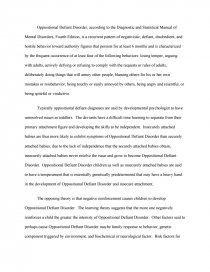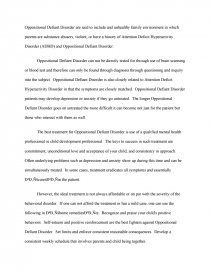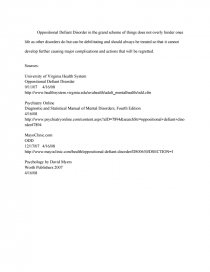Oppositional Defiant Disorder
Essay by review • February 10, 2011 • Research Paper • 631 Words (3 Pages) • 1,340 Views
Oppositional Defiant Disorder, according to the Diagnostic and Statistical Manual of Mental Disorders, Fourth Edition, is a recurrent pattern of negativistic, defiant, disobedient, and hostile behavior toward authority figures that persists for at least 6 months and is characterized by the frequent occurrence of at least four of the following behaviors: losing temper, arguing with adults, actively defying or refusing to comply with the requests or rules of adults, deliberately doing things that will annoy other people, blaming others for his or her own mistakes or misbehavior, being touchy or easily annoyed by others, being angry and resentful, or being spiteful or vindictive.
Typically oppositional defiant diagnoses are said by developmental psychologist to have unresolved issues as toddlers. The deviants have a difficult time learning to separate from their primary attachment figure and developing the skills to be independent. Insecurely attached babies are thus more likely to exhibit symptoms of Oppositional Defiant Disorder than securely attached babies; due to the lack of independence that the securely attached babies obtain, insecurely attached babies never resolve the issue and grow to become Oppositional Defiant Disorder. Oppositional Defiant Disorder children as well as insecurely attached babies are said to have a temperament that is essentially genetically predetermined that may have a heavy hand in the development of Oppositional Defiant Disorder and insecure attachment.
The opposing theory is that negative reinforcement causes children to develop Oppositional Defiant Disorder. The learning theory suggests that the more one negatively reinforces a child the greater the intensity of Oppositional Defiant Disorder. Other factors said to perhaps cause Oppositional Defiant Disorder maybe family response to behavior, genetic component triggered by environment, and biochemical or neurological factor. Risk factors for Oppositional Defiant Disorder are said to include and unhealthy family environment in which parents are substance abusers, violent, or have a history of Attention Deficit Hyperactivity Disorder (ADHD) and Oppositional Defiant Disorder.
Oppositional Defiant Disorder can not be directly tested for through use of brain scanning or blood test and therefore can only be found through diagnosis through questioning and inquiry into the subject. Oppositional Defiant Disorder is also closely related to Attention Deficit Hyperactivity Disorder in that the symptoms are closely matched. Oppositional Defiant Disorder patients may develop depression or anxiety if they go untreated. The longer Oppositional Defiant Disorder goes on untreated the more difficult it can become not just for the patient but those who interact with them as well.
The best treatment for Oppositional Defiant Disorder is use of a qualified mental health professional or child development professional. The keys to success in such treatment are commitment, unconditional love and acceptance of your child, and consistency in approach. Often underlying problems such as depression and anxiety show up during this time and can be simultaneously
...
...


